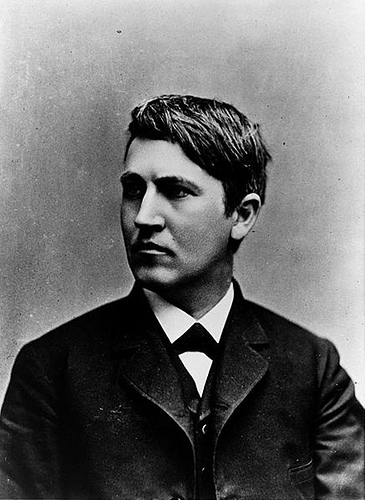
Thomas Edison – “too stupid to learn anything”
Updated August 15, 2020
Finding a right answer is sometimes not that important. More important is learning to approach a problem correctly, to study a mathematic question from different angles and to resist the urge to give up. This is best taught in middle school. In grades 6 – 8 if a student fails a test or gets a “D” or “F” in class, it will have no effect on his or her college admission records. This failure, though, can become a valuable life lesson. In fact, if approached properly a teacher can help students prepare themselves for high school, for college and even find good jobs. Here is what is needed:
First, become conscious that you, as a math instructor, have a dual role – to teach math concepts AND to teach character development.
Next, share as many examples as you can of people who faced failure but didn’t give up. Johannes Kepler, the German mathematician, filled 10,000 folio pages with calculations before discovering that the planets circled the sun in an ellipse. Teachers told Thomas Edison that he was “too stupid to learn anything.” And he failed almost a thousand times before he designed a light bulb that worked. Here are another 49 famous people who failed at first before they succeeded.
Finally, build a culture in your class or home where it’s okay to make mistakes. We learn from mistakes. And if your students fail, find out why. It could very well be that they need to study more, or study more effectively. Empower them to dig deeper into the problem by showing them the opportunities they have. Assure them that they have the capability to work a little more, a little harder.
Becoming a great instructor
If you can teach both math and character development in your class, you’ll go from being a good instructor to a great one. You won’t just help the students learn math skills, but you will teach them to handle better the uncertainties in life. Leonardo Da Vinci called it sfumato (literally, “up in smoke”). He saw the importance of people becoming comfortable with life’s ambiguities: joy and sorrow, beauty and ugliness, success and failure. Life will feel more balanced. Character will become stronger.
Studies have shown that students who succeed in college are not necessarily the ones who do well academically in high school. Instead, these studies show that successful college students have exceptional character strengths, like optimism and persistence and social intelligence. These students are able to recover from a bad test and quickly decide to do better next time. They bounce back from a fight with their friends. They resist spending time with their friends and study instead.
By helping your students develop strong characters, you help them avoid the bad habits that develop from an inability to handle the doubts and fears of the uncertainty of life. These habits include obsessive fantasies, talking excessively, smoking, drinking, taking drugs.
I bet you didn’t think teaching math was so important!
